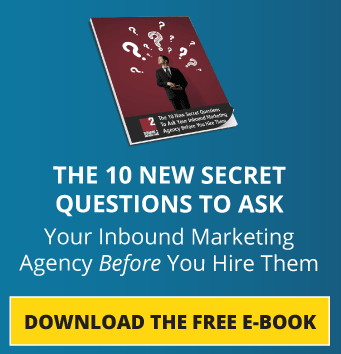
Why RFPs The Worst Way To Choose Your Next Digital Marketing Agency
You Think An RFP Is Going To Make It Easier, But It’s The Wrong Way To Find An Agency Partner
We rarely respond to request for proposals (RFPs) from prospective clients. We actually have a test, and if the company passes the test, only then will we participate. But lately I’ve been thinking a lot about the process, and if you think running an RFP is going to help you find the agency of your dreams, think again.
I know it sounds right on the surface. You run RFPs for other stuff you buy, like materials for production or other commoditized services. You might also run RFPs for software you purchase, and I’m guessing you have an entire procurement team and corporate mandate to run all purchases through this team.
Regardless, when it comes to finding a partner to help you generate leads, drive more sales opportunities, close more new customers and transform the way you market and sell to create a revenue generation machine, RFPs are a mistake.
Let’s look at this in more detail.
The Best Agencies Won’t Participate
This might be the biggest reason to not do an RFP. As I said earlier, we opt out of RFP requests all the time. The best agencies don’t need to go through your RFP process. They have enough business. This means you’re running mediocre agencies through your RFP process, and the end result will be you’ll select a mediocre agency.
There’s something else you should also know.
Agencies are tuned into the fact that most RFPs are just to show corporate leadership that you went through a fair and thorough process. We know you’re already leaning toward one of the agencies participating in the RFP process. That’s why the good agencies rarely participate. It’s a waste of their time. You already know you want to hire the new-fangled agency. Why should we even bother?
Now I mentioned a secret way in which we evaluate RFPs, and that is legitimate. If we get an RFP and the sponsor is willing to talk to us, go through our sales process and allow us to get to know them, then in some situations we will participate. It’s in your best interest to let us get to know you.
If we just fill out a form and provide you stock answers to stock questions, you won’t ever get to learn what you really need to learn from us.
The Questions You’re Asking Are Not About You
 Here’s why and where the RFP process goes off the rails. All the questions you ask are about us – who we’ve worked with before, what we did for them, what our processes are, how we do what we do, etc.
Here’s why and where the RFP process goes off the rails. All the questions you ask are about us – who we’ve worked with before, what we did for them, what our processes are, how we do what we do, etc.
Honestly, most of that stuff is on our website.
Taking it off our website and putting it in your document is a waste of time for us and for you. Instead, you and your entire team should be spending time with us talking about you!
If you really want to know if we’re the right agency for you, then we should be talking all about you:
- What are you trying to accomplish?
- What have you already done that worked well and didn’t work so well?
- How are you going to measure success?
- How do you want to work with us?
- What resources do you have and what resources do you need us to provide?
- What level of investment are you planning and is it aligned with your expectations?
- What business outcomes and results is the CEO expecting? When?
- What technology are you using?
- How is the sales team aligned with the marketing goals?
- How intimate are you with your prospects’ buyer journeys?
- Are your customers advocates of your business?
The questions go on, but this gives you a flavor of what we care about when we consider helping companies. If you’re thinking about working with an agency and they don’t ask you questions like this, run away.
This is also how we decide to respond to RFPs. We simply ask our contact, “Would your team be open to having a conversation with us so we can get to know you better? We have some questions we’d like to ask.” If they say yes, we’re in and we’ll consider the RFP. If they say no, and many do, we’re out.
It’s as simple as that. If we can’t get to know you, your company, your industry, your challenges and your goals, we can’t help you – and neither can any other agency.
The Process Doesn’t Allow Agencies To Get To Know You
I know why companies do an RFP process. But that process is not designed to help you pick the right agency; it’s designed to level the playing field. It’s an attempt to put all the agencies in the same box and then allow the team to evaluate each box.
That’s not how you hire. That’s not how you find the right partner in life. That’s not how you make your own purchase decisions outside of work.
Let me take it one step further. Is that how you like engaging with your prospects? Do you like being asked to fit into their RFP process? Do you think it helps your customers make the right purchase decision? I already know the answer.
But in this case, you’re looking for an agency to help you generate more leads, more sales opportunities and more revenue. Shouldn’t they eat their own dog food? Isn’t the process they execute that brings you into their orbit important? Wouldn’t you want to see their sales process to know if they can help you with yours? Wouldn’t you want to consume their content to see if they can help you with your content marketing?
In fact, the difference between agencies and how they work with prospects is one of the most interesting aspects of picking an agency. Instead of pushing them into the same process, let them execute their own process and then evaluate them on how you felt while in that process.

It’s Not Personal, And This Work Is Very Personal
The RFP process is impersonal by design. I get it. But the work you’re asking the agency to do is highly personal. An impersonal process is the wrong process for this kind of work.
In some cases, we’re spending hours with our clients every single day. We’re huddling in the morning and then regrouping in the afternoon. We’re having workshops and reviewing creative work. We have to be honest and open with them, so we need them to be open and honest with us.
It’s a very personal relationship. We’ve become friends with many of our clients.
You should want to get to know the people you’re going to be working with in a very personal way. You should like them as people. You should trust them as professionals. You should respect them as experts in their trade. You should have this type of deep relationship with many of the people in the agency.
At Square 2, you don’t just work with your account person. You work with your growth consultant for sure, but you also work with your content creator, your designer, your website expert, your paid media specialist, your sales enablement expert and many of the senior-level executives at the company on a regular basis. How are you going to get to know those people in an RFP process?
In many cases, our engagements are transformational. The companies look dramatically different when we’re done with our work. This requires us to interact with many different people within a client’s organization, from the C-level to sales, marketing, operations, customer service and often even finance.
An RFP will never uncover the personalities and interpersonal skills required to lead a change management initiative like the ones we’re asked to lead every single day.
The People On The Review Committee Won’t Have Context To The Answers
In a typical RFP process, someone leads the answer collection process. They put the RFP out to a number of agencies, they manage the process, they shield the rest of the organization from having to talk to the agency and, in some cases, they answer questions.
The result of this effort is usually some document or presentation materials. Then the selection committee reviews those materials.
In most cases, the person managing the RFP process has had some interactions with at least some of the agencies. They’ve answered questions, they’ve reviewed websites, they’ve downloaded content and they may have even spoken to agency reps once or twice.
All of these experiences add context to the answers provided in the RFP. Very rarely does that context get transferred to the people tasked with selecting, meaning they have only partial information to make that decision.
Here’s an example. We offer a very unique type of engagement. It provides a dedicated team, instead of a fractional team, to produce six months of work in just 30 days. The details of how we do this are many. Explaining this in a standard RFP is difficult and time-consuming, and that assumes we even have a place to talk about something like this.
Sharing how we do this in person is exciting and simple. But those details might be lost in translation when it comes to discussing our RFP answers with the selection committee.
Again, that means the committee will be making a decision with only partial information. They’re picking the agency based on who is best at filling out their RFP, not who is the best positioned to help them grow their company.
I’ll go back to my earlier question. Would you hire a senior-level executive based on their answers to standard questions? Would you get married to someone based on their answers to standard questions? Of course not.
Don’t pick your agency without getting to know them. Don’t pick your agency without letting them get to know you. You’re not purchasing 10,000 boxes of staples. You’re creating a long-term partnership to do something you’ve never done before — build a scalable, repeatable and predictable revenue generation machine. Choose wisely.

CEO and Chief Revenue Scientist
Mike Lieberman, CEO and Chief Revenue Scientist
Eliminate Hit-or-Miss Marketing Moves
Get advice, tips, tools and guidance to generate more leads for your company in this weekly email newsletter.



Eliminate Hit-or-Miss Marketing Moves
Get advice, tips, tools and guidance to generate more leads for your company in this weekly email newsletter.













